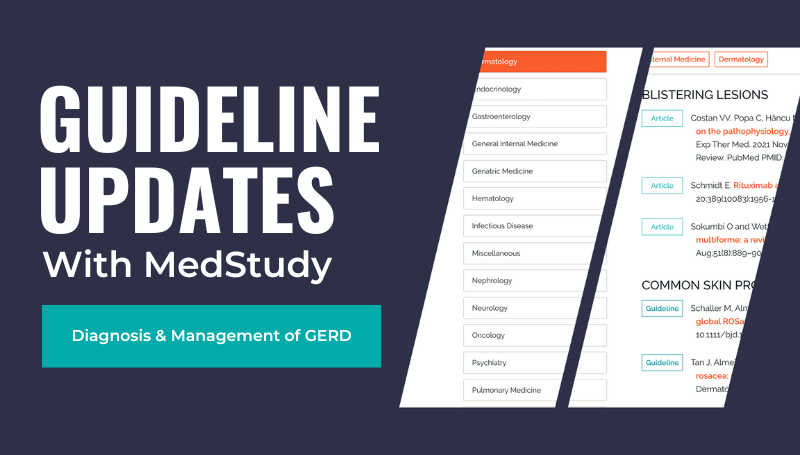Guideline Updates With MedStudy | Diagnosis & Management of GERD

Vijay Pottathil, MD, Medical Director GI & Hepatology at San Mateo Medical Center, explains the 2022 guidelines for the diagnosis and management of gastroesophageal reflux disease from the AJG.
Good news! The new guidelines are both consistent with and similar to the previous iteration. Dr. Pottathil points out the following changes that will effect your decision-making as an Internist.
Diagnose & manage
Unlike the past guidelines where patients were kept on PPI therapy indefinitely, this updated guideline recommends discontinuing PPI therapy after eight weeks.
If a patient has recurrent symptoms, or never responds to the PPI therapy, the recommendation is to pursue an upper endoscopy with the purpose of determining if the patient has erosive esophagitis or non-erosive reflux disease. Then, based on the endoscopy, determine whether the patient has LA Class A, B, C, or D which would either confirm a diagnosis of GERD or require more monitoring.
Lastly, to further aide in disease management, interview the patient and reference the figure in the guideline to determine if weight loss or other lifestyle modifications make sense for the patient.
Extraesophageal manifestations
If a patient has typical GERD, the guidelines are recommending eight to twelve weeks of PPI therapy.
If the patient does not have typical GERD, the recommendation is to proceed straight to reflux monitoring which is 24- or 48-hour pH studies.
Surgical intervention
There is moderate evidence that in patients with established GERD, one can proceed with surgical intervention. Dr. Pottathil summarizes options from the guideline update, noting that the evidence is lower for the more cutting-edge endoscopic interventions, resulting in a slightly ambivalent recommendation.
Side effects of PPI therapy
Because of recent data, the ACG is now recommending:
- Patients be on the lowest dose of PPI that's effective
- Discontinuing therapy when feasible
Please note that overall the guideline still recommends the use of PPI therapy when it's appropriate.
Get the full overview of the update here:
Looking for more information on the latest guideline updates? Check out our Hub!


